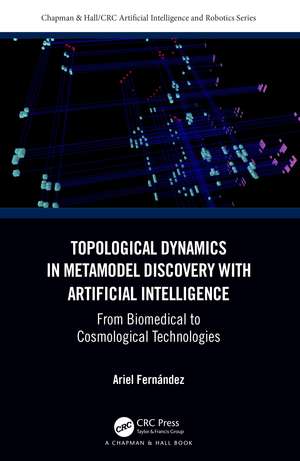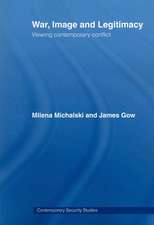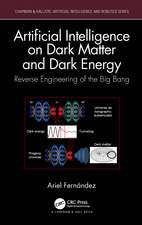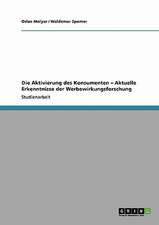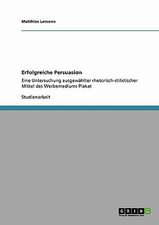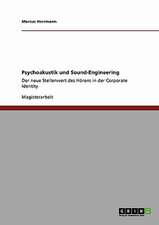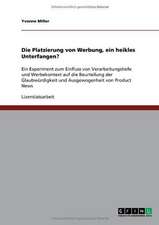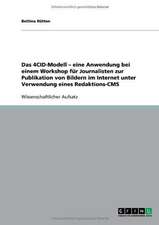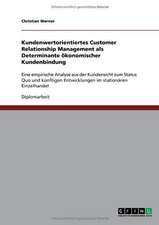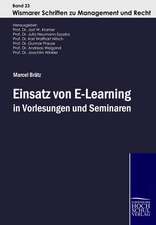Topological Dynamics in Metamodel Discovery with Artificial Intelligence: From Biomedical to Cosmological Technologies: Chapman & Hall/CRC Artificial Intelligence and Robotics Series
Autor Ariel Fernándezen Limba Engleză Paperback – 9 oct 2024
Dealing with artificial intelligence, this book delineates AI’s role in model discovery for dynamical systems. With the implementation of topological methods to construct metamodels, it engages with levels of complexity and multiscale hierarchies hitherto considered off limits for data science.
Key Features:
- Introduces new and advanced methods of model discovery for time series data using artificial intelligence
- Implements topological approaches to distill "machine-intuitive" models from complex dynamics data
- Introduces a new paradigm for a parsimonious model of a dynamical system without resorting to differential equations
- Heralds a new era in data-driven science and engineering based on the operational concept of "computational intuition"
| Toate formatele și edițiile | Preț | Express |
|---|---|---|
| Paperback (1) | 357.58 lei 6-8 săpt. | |
| CRC Press – 9 oct 2024 | 357.58 lei 6-8 săpt. | |
| Hardback (1) | 514.45 lei 6-8 săpt. | |
| CRC Press – 21 dec 2022 | 514.45 lei 6-8 săpt. |
Din seria Chapman & Hall/CRC Artificial Intelligence and Robotics Series
-
 Preț: 332.56 lei
Preț: 332.56 lei - 20%
 Preț: 197.44 lei
Preț: 197.44 lei -
 Preț: 145.35 lei
Preț: 145.35 lei - 20%
 Preț: 399.77 lei
Preț: 399.77 lei -
 Preț: 190.03 lei
Preț: 190.03 lei - 20%
 Preț: 323.38 lei
Preț: 323.38 lei - 20%
 Preț: 286.01 lei
Preț: 286.01 lei - 20%
 Preț: 196.61 lei
Preț: 196.61 lei -
 Preț: 349.80 lei
Preț: 349.80 lei -
 Preț: 364.18 lei
Preț: 364.18 lei - 20%
 Preț: 246.56 lei
Preț: 246.56 lei -
 Preț: 347.45 lei
Preț: 347.45 lei - 20%
 Preț: 590.30 lei
Preț: 590.30 lei - 28%
 Preț: 258.52 lei
Preț: 258.52 lei - 31%
 Preț: 514.03 lei
Preț: 514.03 lei - 8%
 Preț: 374.62 lei
Preț: 374.62 lei - 27%
 Preț: 274.84 lei
Preț: 274.84 lei -
 Preț: 372.24 lei
Preț: 372.24 lei - 30%
 Preț: 223.76 lei
Preț: 223.76 lei -
 Preț: 505.84 lei
Preț: 505.84 lei - 28%
 Preț: 274.76 lei
Preț: 274.76 lei - 20%
 Preț: 362.94 lei
Preț: 362.94 lei - 28%
 Preț: 263.46 lei
Preț: 263.46 lei - 23%
 Preț: 854.26 lei
Preț: 854.26 lei - 20%
 Preț: 849.41 lei
Preț: 849.41 lei - 5%
 Preț: 429.02 lei
Preț: 429.02 lei - 15%
 Preț: 662.18 lei
Preț: 662.18 lei - 20%
 Preț: 570.49 lei
Preț: 570.49 lei - 20%
 Preț: 1013.62 lei
Preț: 1013.62 lei - 18%
 Preț: 1104.45 lei
Preț: 1104.45 lei -
 Preț: 390.75 lei
Preț: 390.75 lei - 20%
 Preț: 355.34 lei
Preț: 355.34 lei - 23%
 Preț: 514.45 lei
Preț: 514.45 lei
Preț: 357.58 lei
Preț vechi: 446.97 lei
-20% Nou
Puncte Express: 536
Preț estimativ în valută:
68.42€ • 74.56$ • 57.66£
68.42€ • 74.56$ • 57.66£
Carte tipărită la comandă
Livrare economică 23 aprilie-07 mai
Preluare comenzi: 021 569.72.76
Specificații
ISBN-13: 9781032366333
ISBN-10: 1032366338
Pagini: 228
Ilustrații: 178
Dimensiuni: 156 x 234 mm
Greutate: 0.33 kg
Ediția:1
Editura: CRC Press
Colecția Chapman and Hall/CRC
Seria Chapman & Hall/CRC Artificial Intelligence and Robotics Series
Locul publicării:Boca Raton, United States
ISBN-10: 1032366338
Pagini: 228
Ilustrații: 178
Dimensiuni: 156 x 234 mm
Greutate: 0.33 kg
Ediția:1
Editura: CRC Press
Colecția Chapman and Hall/CRC
Seria Chapman & Hall/CRC Artificial Intelligence and Robotics Series
Locul publicării:Boca Raton, United States
Public țintă
Academic, Postgraduate, Professional Reference, and Undergraduate AdvancedNotă biografică
Ariel Fernández is an Argentine-American physical chemist and mathematician. He obtained a Ph. D. degree in Chemical Physics from Yale University and held the Hasselmann Endowed Chair Professorship in Bioengineering at Rice University until his retirement. To date, he has published over 400 scientific papers in professional journals including PNAS, Nature, Nature Biotechnology, Physical Review Letters, Genome Research and Genome Biology. Fernández has also authored five books on biophysics and molecular medicine and holds several patents on technological innovation. Since 2018 Fernández heads the Daruma Institute for Applied Intelligence, the research arm of AF Innovation, a Consultancy based in Argentina and the USA.
Cuprins
Preface. About the Author. Part I Fundamentals. Chapter 1 Artificial Intelligence and Dynamical Systems. Chapter 2 Topological Methods for Metamodel Discovery with Artificial Intelligence. Part II Applications. Chapter 3 Artificial Intelligence Reverse-Engineers In Vivo Protein Folding. Chapter 4 The Drug-Induced Protein Folding Problem: Metamodels for Dynamic Targeting. Chapter 5 Targeting Protein Structure in the Absence of Structure: Metamodels for Biomedical Applications. Chapter 6 Autoencoder as Quantum Metamodel of Gravity: Toward an AI-Based Cosmological Technology. Epilogue. Appendix. INDEX.
Descriere
Dealing with artificial intelligence, this book delineates AI’s role in model discovery for dynamical systems. With the implementation of topological methods to construct metamodels, it engages with levels of complexity and multi-scale hierarchies hitherto considered off limits for data science.
